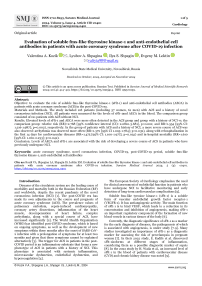Evaluation of soluble fms-like thyrosine kinase-1 and anti-endothelial cell antibodies in patients with acute coronary syndrome after COVID-19 infection
Автор: Valentina A. Kozik, Lyubov A. Shpagina, Ilya S. Shpagin, Evgeny M. Loktin
Журнал: Saratov Medical Journal @sarmj
Статья в выпуске: 4 Vol.5, 2024 года.
Бесплатный доступ
Objective: to evaluate the role of soluble fms-like thyroxine kinase-1 (sFlt-1) and anti-endothelial cell antibodies (AECA) in patients with acute coronary syndrome (ACS) in the post-COVID era. Materials and Methods. The study included 118 patients (including 57 women, 61 men) with ACS and a history of novel coronavirus infection (NCI). All patients were measured for the levels of sFlt-1and AECA in the blood. The comparison group consisted of 121 patients with ACS without NCI. Results. Elevated levels of sFlt-1 and AECA were more often detected in the ACS group and group with a history of NCI vs. the comparison group: relative risk (RR)=2.768 [95% confidence interval (CI): 2.0810-3.681], p<0.001; and RR=1.554 [95% CI: 1.216-1.987]; p=0.002), respectively. In the group of patients with ACS and a history of NCI, a more severe course of ACS was also observed: arrhythmia was observed more often (RR=1.372 [95% CI 1.005-1.784]; p=0.032), along with rehospitalization in the first 14 days for cardiovascular diseases (RR=1.475 [95% CI: 1.100-1.977]; p=0.032) and in-hospital mortality (RR=1.610 [95% CI: 1.160-2.233]; p=0.042). Conclusion. Levels of AECA and sFlt-1 are associated with the risk of developing a severe course of ACS in patients who have previously undergone NCI.
Acute coronary syndrome, novel coronavirus infection, COVID-19, post-COVID-19 period, soluble fms-like thyrosine kinase-1, anti-endothelial cell antibodies
Короткий адрес: https://sciup.org/149148541
IDR: 149148541 | DOI: 10.15275/sarmj.2024.0401


